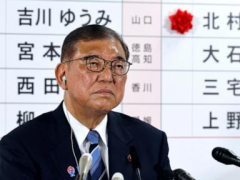TOKYO — TOKYO (AP) — Japanese Prime Minister Shigeru Ishiba ’s ruling coalition failed Monday to secure a majority in the 248-seat upper house in a crucial parliamentary election, further shaking the stability of his government as Japan faces challenges such as rising prices and high U.S. tariffs.
Ishiba’s Liberal Democratic Party and its junior coalition partner Komeito, which needed to win 50 seats on top of the 75 seats they already have to retain their majority, won 47 seats. It was three seats short of a majority and a retreat of 19 seats from before the vote.
The loss is another blow to Ishiba’s coalition, making it a minority in both houses following its October defeat in the lower house election, and worsening Japan’s political instability. It was the first time the LDP-led coalition has lost a majority in both houses of parliament since the party’s formation in 1955.
Despite the loss, Ishiba expressed determination to stay on and not create a political vacuum to tackle challenges such as U.S. tariff threats, but he could face calls from within his party to step down or find another coalition partner.
“I will fulfill my responsibility as head of the No. 1 party and work for the country,” he said.
Ishiba had set the bar low, wanting a simple majority of 125 seats, which means his LDP and its Buddhist-backed junior coalition partner Komeito needed to win 50 seats. Exit poll results released seconds after the ballots closed Sunday night mostly showed a major setback for Ishiba’s coalition.
The LDP alone won 39 seats, better than most exit poll projections of 32, and still the No. 1 party in the parliament, known as the Diet. But Ishiba said the coalition’s poor showing was because his government’s measures to combat price increases had yet to reach many people.
“It’s a tough situation. I take it humbly and sincerely,” Ishiba told a live interview with NHK.
The poor performance in the election will not immediately trigger a change of government because the upper house lacks the power to file a no-confidence motion against a leader, but it will certainly deepen uncertainty over his fate and Japan’s political stability. Ishiba could face calls from within the LDP party to step down or find another coalition partner.
Soaring prices, lagging incomes and burdensome social security payments are the top issues for frustrated, cash-strapped voters. Stricter measures targeting foreign residents and visitors also





